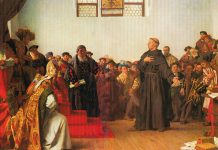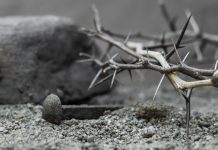Justin Yang is the Senior Pastor of Atlanta Korean Seventh-day Adventist Church in Duluth, Georgia, United States. He was born in South Korea, but his family moved to America when he was a child, so that his father, who is also a pastor, could continue his education. Pastor Yang went to school in the US but returned to South Korea for his undergraduate studies where he attended Sahmyook Adventist University in Seoul.
Tell us a bit about your beginnings. Were you born into a Seventh-day Adventist family?
Yes, I was born a pastor’s child. My father pastored one of the churches in South Korea and my earliest memory of Korea is my parents being in the ministry and just witnessing their faithfulness in the message entrusted to them. That was my first encounter with the faith that I now have, so I’m very grateful for my memories in South Korea.
Is South Korea a country with a strong Adventist presence?
Yes. The Adventist presence in South Korea currently stands at about two hundred thousand, out of about one million Christians.
Our church also has quite a number of important institutions. I briefly visited Sahmyook University, which amazed me with its size.
It is known as the largest Adventist university in the world. Currently, it has over six thousand students on campus. We also have the hospital, the Language Institute, and the soya milk factory.
At one point, you moved to America. Can you expand on that?
Because of my dad’s profession as a pastor, he felt the need to study further, so he came to Andrews University, and I came along. I was very young. Ever since that moment, I have been raised in the States. Throughout my upbringing in America, I experienced a culture shock, and I had to adjust and learn the language. Still, it is where I experienced unique spirituality because of the incredible Adventist education that was offered here.
Did you also do your undergraduate studies there?
No, I actually went back to Korea, to Sahmyook University for my undergraduate studies. It’s an interesting story because most people come to the States to study in college and university. But I grew up here and I went back to my homeland. My father attended Sahmyook University, and he loved the experience there. He felt that there was a level of raw and real spirituality that could be experienced on the campus of Sahmyook, and he wanted me to go back to my roots.
Was it difficult for you to go back?
At first, it was very challenging for me, because I didn’t know how I would study there, given the language barrier.I had been living in the US for about fourteen years. In the first months, it was a real struggle because all of the classes and books were in Korean.
How long did you stay in South Korea?
I spent seven years in Korea. During that time, I did military service, spent a year in India as a student missionary, and spent more time in Southeast Asia.
Tell us about your time in the military. Were you accepted with the religious lifestyle and practices? Or was it something very demanding and strict, like the military usually is?
The military experience was one of the most challenging times of my life. Back then, you were actually forced to work on Sabbath. You had six working days, and Sunday was the day off. They only recognised certain religions and belief groups.
So, when I entered the Korean army, it was the first time in my life that I was persecuted for my faith. Because of my choice to keep the Sabbath holy and conscientiously object to bearing arms, I was sent to prison and I spent some time in the army prison. Those were times in my life when I felt that that’s where the rubber meets the road.
By the grace of God working in me, I was able to stand up for my faith and as a result, I was persecuted for my faith. That was very traumatic but at the same time it was a wake-up call, and I realised that this was the fruit of the education I had received, that everything I had done until then had materialised into this moment.
Did you regret returning to Korea when you got sent to prison?
That’s a good question. I went through really difficult times. When I was in the prison cell, people were beating me. They tried to persuade me many times, saying, “If you just recant your need idea to keep the Sabbath and not bear arms, you can have a very comfortable life here.”
Many tried to convince me with gentle words at first, but when that didn’t work, they resorted to force. In the most challenging moments of my time in the Korean army, I cried out to God, “If I hadn’t come back to Korea, I wouldn’t be experiencing any of this!” I can’t say that I didn’t have regrets.
Even with a large Adventist presence in South Korea, did you still have no legal protection?
There are petitions and requests that can be made, but ultimately it is the government that decides. Back in those days, there were six working days, which meant that on the Sabbath you had to train, work and go with the schedule. Now, because the government has transitioned to five working days and because of the many predecessors who chose to respect their beliefs, it is now much easier for soldiers to keep their faith.
I would like to add something. It’s not in the realm of the army, it’s about university studies. Recently, some medical students refused to take an exam on the Sabbath, so they had to forfeit their pursuit of a medical career. They pursued a legal proceeding and had a victory. Now, medical students can have alternative exam dates. If they want to keep the Sabbath, they can take the exam on Sunday or any other day.
In the last decades, Adventists and Christians of other denominations from South Korea have become very interested in overseas ministry and missionary work. Now, South Korea is one of the most important sources of missionaries, even in very risky places.
Yes, we are very grateful for God’s leading in the realm of mission. By the grace of God, we are the second country, after the United States, in the number of missionaries sent to different parts of the world. As you mentioned, we have been present in the most difficult places, such as the Middle East or in countries that are extremely poor. We have been sending missionaries there and God has been blessing our efforts.
What makes Koreans adjust to difficult situations? Is it part of your history?
If you know a little bit of Korean history, you will know that we went through the Korean War, which left the country devastated; almost everything was destroyed. From nothing to getting the country where it is now, the Korean people have been very hardworking.
It is often mentioned in Christian circles that many missionaries and outside support came to help in the process, but the Korean people have been working hard, and have been very consistent in their efforts. Thus, in just 30 years, they reached an economic status that shocked the world. There is a level of steadfast consistency and diligence which has enabled them to overcome the hardships that they faced.
Does that also include a frugal lifestyle?
A very frugal lifestyle. In fact, they live far below their means. Nowadays, there are also Koreans who spend a little more than they should. But for the most part, the spirit of working hard and being very faithful and consistent remains the ethos of the nation. When you become affluent, there is a tendency to spend and consume more. It’s a continuous battle.
You told me that you were a missionary in India. Tell us more about your experience there.
It was in my second year of Theology at Sahmyook when I encountered the opportunity to volunteer as a student missionary for a year. That’s when I decided that I would love to have this experience as a student, to be dedicating one year to service, to God. I didn’t know where I would be sent. The training was in Cavite, Philippines, and after the training, I was sent to India.
Despite all the training, when I arrived in that village, I had no idea what I needed to do next. You don’t know the language, you stand out, and everyone looks at you very strangely. For two or three months, I knocked on doors, trying to introduce myself: “I’m a missionary from South Korea, my name is Justin Yang, and I would love to help you with anything that you need. I would love to pray with you.” When I made those rounds, the doors would continuously shut: “We don’t need any missionaries!” Many of them were Hindus and did not want to be exposed to any other religion.
But here’s a moment of revelation. I entered a house where there was a woman who was paralysed from the waist down. She could not come out and she said something in Hindi, but I didn’t understand. It almost felt like…
…she was inviting you in.
Yes, maybe it was an invite, but she also sounded like she was in pain, so I rushed in and said, “I’m a missionary from South Korea,” and introduced myself. But she was in a lot of pain and needed help very quickly. The only thing I had with me was some medicinal charcoal, so I brought a cup of water, put the charcoal in, helped her sit and I prayed, “I don’t know what’s happening with her, that’s all I have, I really need You to bring healing upon this lady.”
I gave her the charcoal mixture, and nothing happened at first. But she lay down and after a few minutes she was at peace, she was no longer in pain, she held her thumbs up, and smiled. And I don’t know what she said, but she kept repeating a motion, which I interpreted as meaning: “Come again!”
So, I went to her the next day too and I began to give her massages. We didn’t speak with each other, but I spent time with her. And amazingly, in the third week, as I was massaging her legs, she signalled that she wanted to get up. I helped her up and she began walking with a limp. She had been paralysed for over 18 years and now she was almost screaming because she couldn’t believe what she could do.
All the family members who lived nearby heard her scream, so they came to the house and saw their grandmother, and mother, standing and limping. They were absolutely shocked. I didn’t know what had happened either, and through an interpreter, I told them, “I don’t know exactly what happened and I don’t know your history, but I know that God has a plan for your life.”
In the first three months of missionary work, I had not been received anywhere. This was the first house where I was let in, and as soon as all the families witnessed what had happened, they came to the church and said they wanted to be baptised.
Really?
Yes. Now, the entire household has come to faith. There was a small, almost empty church in the village. Now it’s filled. I stayed in the village. The planting season followed, I went to the field with them, and I did all the hard work and worked all day in the field with them.
Were you used to working in the fields? You lived in the city, right?
What is beautiful is that in the first year of Theology, students in Korea have an agricultural education course which is mandatory. That was the first time in my life that I planted potatoes and all kinds of things.
Everything that I learned there I utilised in the mission field. And people were surprised and shocked: “Here’s a Korean student who knows how to do what the people here do!” I went to the fields with them every day, I helped them, I prayed for them, and I lived next to them, so I began to gain their trust and they began to ask, “What do you want to teach us?” I praise God for that year because it strengthened my faith.
Fast-forwarding to the present day, you are now the pastor of a Korean church here in Atlanta. How long have you been here?
I have spent four years at this church. There are five or six Korean Adventist churches in Atlanta.
Is there a significant number of Koreans in the area?
There are about eighty thousand Koreans. There are still some who come to study or work, but the number of new immigrants has decreased a lot.
What was the situation of the Korean church when you arrived here?
It was a very interesting call because they invited me to be the first English-speaking second-generation pastor to be their senior pastor. Most of the senior pastors in the past were first-generation, Korean-speaking, and in their late fifties or early sixties. They called me to train the next generation of English-speaking Korean Americans to lead this church. That was their vision, and they were looking for someone that could follow this vision and lead the next generation. It was an executive decision that was made by the church board.
What made them make that decision?
I think that when looking carefully around, especially in North America, they saw that many immigrant churches were dying. The median age of the believers was over sixty. The churches had been shrinking and ageing, and the church leaders said, “If we don’t do something right now, if we do not empower and delegate leadership of the church to the next generation, our church might not exist in twenty years. If we don’t do something right now, our church will have no future.”
Many of the next generation, because they no longer speak Korean and many couldn’t find a community where they could speak English but also enjoy Korean culture and fellowship, were all leaving the church. They either went to mainstream American churches or stopped going to church altogether.
What did you do to change the situation?
When I first got there, no one knew what to do and where to begin. I began to pray and seek God’s counsel. We began to implement what is now known as Growing Young commitments. We wanted the church to grow young, to restore its vitality. This did not mean taking away jobs and roles from the older generation but helping them to come alongside young people and mentor them.
That’s interesting! It was not a “bloody” revolution.
No, not at all. We are in this together. We want to grow young together. We want to empower the next generation of leaders together. The elders who were holding positions sought out younger elders, to ordain the next generation. They began to share responsibilities. It was a beautiful cooperation. This is what we call keychain leadership. They were literally handing the keys of leadership to the next generation, making sure they stayed together as a team. They made sure that the transition was complete.
Oftentimes, when we try to delegate responsibilities, we say, “You do this!” But this wasn’t the case. They said, “We want you to now be the leaders, but we’re going to help you through the process.”
What was the response of the younger generation—were they willing to take on the responsibilities?
Yes. At first, some of them felt burdened, because they didn’t have enough knowledge, and they didn’t know if they had enough resources. However, as they saw how serious and committed the older members were, they said, “Okay, we will take on this challenge.”
They took over not only the management of the church, but also the maintenance and organisation of the church: cleaning, cooking for the elderly, visiting the sick, social projects for the Korean community, and so on. The younger generation took it seriously.
Now that they have been given the leadership of the church, they have told other friends who had left the church and other young families they knew: “Come to this church!” So many of the young families came back and now there is a vibrant community of young families that are saying, “This is our church now and we want to be involved in leading it.”
There are two successive divine services: the first is in Korean, attended more by the older generation, and the second is in English, for the second and third generation of Koreans, for whom English is much more accessible.
Did you manage to connect with the Koreans outside the church as well?
We organise many events that involve the Korean community. As a matter of fact, the most recent evangelistic series that we had was held at the Korean Cultural Centre in Norcross, Georgia. We rented a public space and invited all the community people to come.
We also hold five-kilometre races every year, when we invite people from the community to join us and we partner with an organisation, to which we donate all the money obtained from that event.
I am impressed by your early history, your journey, and the way that God gave you the persistence and the humility that helped you navigate those very difficult times in your life. I have this strong faith that you will succeed in your project with the church, whose results are already visible. Thank you!
Note: This is a TV interview by Adrian Bocaneanu, broadcast on HopeTV channel Romania. The transcript of the interview has been edited for brevity and clarity. You can watch the full version here.



















